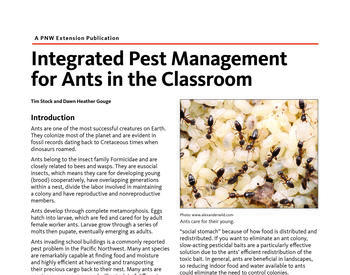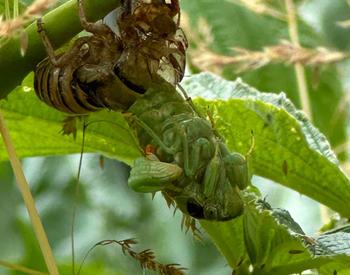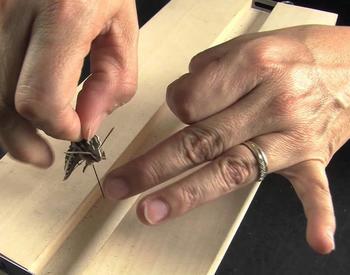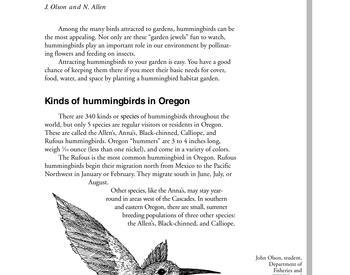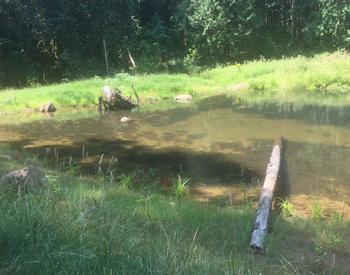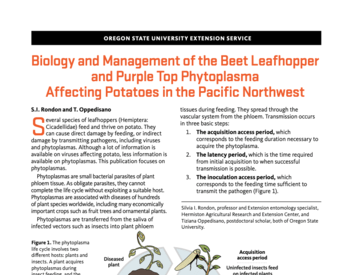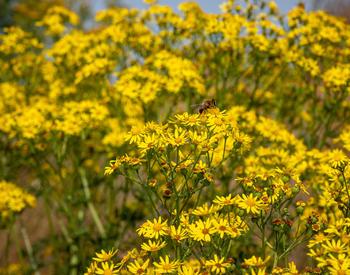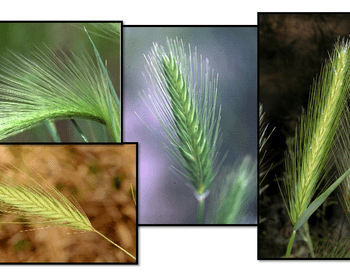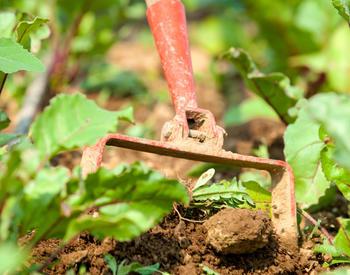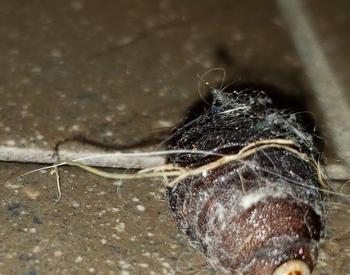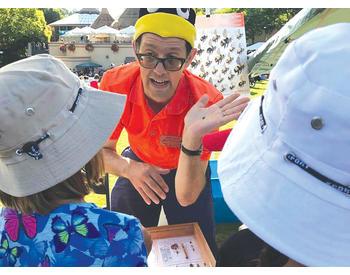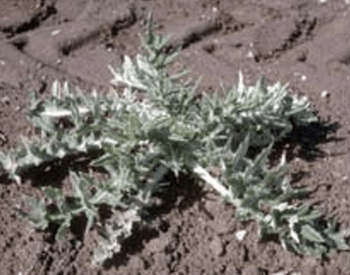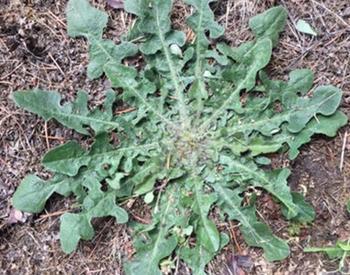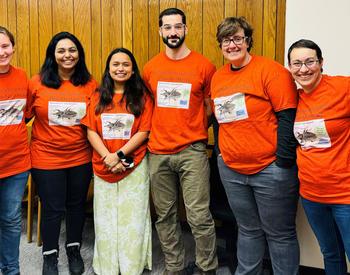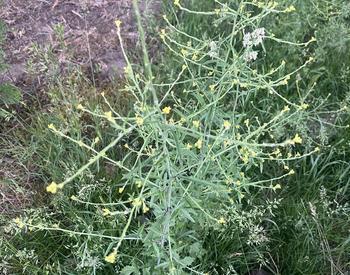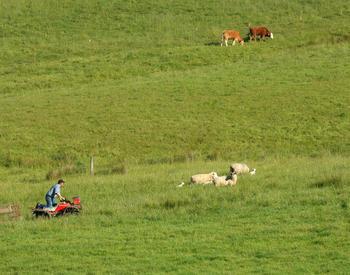Transcript
[00:00:00] Andony Melathopoulos: [00:00:00] From the Oregon State University Extension Service this is PolliNation, a podcast that tells the stories of researchers, land managers, and concerned citizens making bold strides to improve the health of pollinators. I'm your host, Dr. Andony Melathopolous, Assistant Professor in Pollinator Health in the Department of Horticulture.
[00:00:32] Wouldn't it be nice if you encountered some kind of a diseased plant in your backyard or some other kind of pest problem around the house -you could pick up your phone and look at a bunch of pictures, diagnose the problem and get a science based easy to understand recommendation of what to do. Well, that's what Weston Miller has been working on this initiative called Solve Pest Problems. Now, for those of you who don't know Weston, he is really a powerhouse when it comes to OSU's efforts at engaging [00:01:00] the public around urban pest management.
[00:01:02] He leads the OSU Master Gardener Program in Clackamas, Multnomah and Washington County. And through that program, he trains over 175 volunteers per year in integrated pest management - and together they answer over 60,000 questions from the general public. There really is no person better positioned to identify the pinch points and opportunities for changing behavior around pest management in urban settings. Which really is one of the key tasks that we have to confront if we want to make our cities better places for pollinators to live. Hope you enjoy the episode!
[00:01:43] I'm really pleased to be here with Weston Miller. Welcome to PolliNation.
[00:01:47] Weston Miller: [00:01:47] Thanks for having me, it's a pleasure.
[00:01:49] Andony Melathopoulos: [00:01:49] You're in some ways, the godfather of the podcast, because you had a show Grow PDX. Which I think even gave me the idea for doing the show in the first place. And you were super generous in passing that [00:02:00] experience onto me, mentoring me, helping me get my website set up, showing me how to ask questions, the guests - really everything I needed to get started. So I can totally say without a word of a lie, it is really a pleasure having you here finally on episode 121.
[00:02:15] Weston Miller: [00:02:15] Yeah, well, that was a pleasure to get you set up and going. I had you on as a guest on Grow PDX a couple of times, and that was fun. And I really do love the audio format of radio and podcasts. So, thank you for having me!
[00:02:28] Andony Melathopoulos: [00:02:28] Well, that's really fitting because you know, this episode is really about how to get information to a lot of people in a concise way. I mean, we've had past episodes where we've talked about pesticide use in agriculture and how we train pesticide applicators to get information to them. We really haven't talked about urban pesticide use. So perhaps just to set this episode up, how big a problem is the issue of pesticide use in cities?
[00:02:51] Weston Miller: [00:02:51] Well, I think that pesticides are available at stores, hardware stores, home centers, et cetera. People use them and people have [00:03:00] them in their home and we're doing some user testing for Solve Pest Problems website development project that we're doing. And we've been invited to a couple of people's homes recently and I'm finding like from yellow jacket to rats to weeds like dandelions and things like that. Pesticide use seems to be pretty common among regular folks for sure. And then in working with the Master Gardener Program, we answer tens of thousands of questions from the public every year here in the Portland area. And we definitely find that at least a segement of the population wants to know details about pesticides.
[00:03:43] Andony Melathopoulos: [00:03:43] Okay. That's interesting. So people have a wide range of pest control products in their homes. They're trying presumably to control a wide range of pest problems. And I guess that begs the question, where are they currently getting that information? I mean, we pride ourselves in extension that we've got a lot of science-based [00:04:00] information available for the public, but is that where they're going to get their information? Or are there other sources that you've discovered are really important to them?
[00:04:09] Weston Miller: [00:04:09] I think with the general public, at least here in Oregon, people don't know about OSU necessarily, and we don't really have adequate pest management information to convey to them at this point. So certainly some people get information from Master Gardener volunteers, public events, farmer's markets and Fix-It Fairs and things like that. We're also at the International Rose Test Garden and the Oregon Zoo. Otherwise the folks we've talked to recently have said they get information from employees, at stores like hardware store. And then they also look online to find information and do Google searches and sometimes are disappointed about that information. Like if it's a blog or sort of a non reliable information source and also in talking [00:05:00] with Spanish language. So when they just Googles something, it took them out of the country and they were finding information that wasn't pertinent to our region.
[00:05:08] Andony Melathopoulos: [00:05:08] Ah, okay. So what you're saying is the information that's maybe most accessible and easiest to get is not necessarily the best information, the most reliable, the most vetted.
[00:05:19] Weston Miller: [00:05:19] There is a clearly identified need and we are trying to address that gap.
[00:05:27] Andony Melathopoulos: [00:05:27] Okay, great. So you saw this problem, you saw this gap and this is really the genesis of this website, Solve Pest Problems - it's under development. Maybe roll the story back just a little bit. How did you actually get this whole initiative started?
[00:05:39] Weston Miller: [00:05:39] Sure, I've run the Master Gardener Program here in the Portland Metro area for about twelve years. And it was pretty clear from the get-go that OSU just didn't really have a good set of materials to share with the public or to have Master Gardeners use. And then in working with my agency [00:06:00] friends here in the area, a regional government body called Metro, plus a number of soil and water conservation districts, City of Portland, City of Gresham, the Oregon Department of Agriculture - they all incurred to start planning a comprehensive pest management website. It has been about five years of planning now, initially they started to provide us with contracts to do planning acvtivities and to ask folks out in the community what their pest management information needs are. And it's grown from there to the point where at this point we have some job examples, we are doing user testing in hopes to continue to develop information resources to make it available to them.
[00:06:50] Andony Melathopoulos: [00:06:50] Now I imagine there is a lot of material in the extension catalogs, on the websites that are relevant, what's wrong with [00:07:00] those? How are they missing the mark in terms of this audience?
[00:07:06] Weston Miller: [00:07:06] Great question. It's a different audience. I'd say we have tons of really good resources out there for agricultural audiences. And those are really the intention of things like the PNW Insect Disease and Weed Management Handbook. And the folks we're trying to address don't have technical backgrounds, they're looking for a really straight forward information. So what we found was how to do it, was to basically translate the information from OSU and other great resources into sixth to eight grade reading level language. So that it's understandable for the lay audience or regular folks without a background in pest management or horticulture or anything specialized field.
[00:07:52] Andony Melathopoulos: [00:07:52] And I imagine the other problem as well in addition to it being in complicated maybe [00:08:00] agriculture specific language and agriculture context is that it is scattered all over the place. I imagine that makes it very hard.
[00:08:06] Weston Miller: [00:08:06] Yes, that is definitely true. There's information at different sources - they all are used a little bit differently. We train our Master Gardeners to use those resources and it really takes quite a bit for them to do that and things change regularly. So our hope is to have a comprehensive across the board interest and approach that will allow people to find information, figure out what's going on in terms of identification, learn what their options are and then they can form a decision.
[00:08:36] Andony Melathopoulos: [00:08:36] You know, finally, I guess the other limitation with current extension material is it's probably all in English.
[00:08:43] Weston Miller: [00:08:43] That's absolutely correct. Along the way it's been really clear from stakeholders that having Spanish language content and other languages for that matter would be really handy, especially here in Oregon. So we've done a really in depth [00:09:00] look at Spanish language content, how to do it and we've convened an advisory group to provide us with guidance. And the good news is we've made a lot of progress and got a lot of really, really good feedback that has informed the project overall to make it more usable for the lay audience - that's our intended group.
[00:09:19] Andony Melathopoulos: [00:09:19] Man this sounds great. I mean I consider myself when it comes to a lot of pest problems kind of a lay person. So, maybe let's take a quick break. And when we come back I'll pitch you a couple of pest problems that I would have encountered, and we can work through the flow of how Solve Pest Problem the website would help me come to addressing some of those problems.
[00:09:38] Weston Miller: [00:09:38] Okay.
[00:09:46] Andony Melathopoulos: [00:09:46] Okay. So let's start with a real example. I've got some roses, this is actually happened to me and I've got spots on the leaves. I want them to look really nice, this is a real problem for me. When Solve Pest Problems comes online, how would I ask it this question? [00:10:00] How would I interface with it? I'll be able to solve my pest problem!
[00:10:05] Weston Miller: [00:10:05] We hope that folks will find us or what we also are doing search engine optimization so that when people do write, "rose black spots" - hopefully we will come up towards the top of the list.
[00:10:18] Andony Melathopoulos: [00:10:18] Okay.
[00:10:18] Weston Miller: [00:10:18] You would get to our home page and then "what's wrong with my plant?" would be the category where you'd find roses in that you could click on the rose link. And then we will have photographs so people see the different kinds of signs and symptoms that they might see on roses, including black spot which is a very descriptive -the name is the disease, "black spot". And you could get to that area and find information about it, that it is a fungal disease and that really there's lots you can do about it.
[00:10:56] Starting with planting disease resistant roses, [00:11:00] doing a lot of really good hygiene along the way. And then if you really need to do something about it, there are fungicide products available. But all that is unnecessary if you start out on the right foot and have resistant roses in the first place. And that would all be spraying for Western Oregon here where we have really high disease pressure during the spring time and roses that are susceptible to black spot are going to get it.
[00:11:31] Andony Melathopoulos: [00:11:31] Okay, great. So I get all of these kinds of solutions that would pop up and I guess define the rose as well. I'd have like a variety of pictures or I'd have like some way to search for the problem?
[00:11:44] Weston Miller: [00:11:44] Yeah. We'll have a way that people can find the information through a visual search. We will also have a search or typing keywords feature so people could get to our website and find the page that way as well.
[00:11:59] Andony Melathopoulos: [00:11:59] Man, that sounds [00:12:00] so easy to use. And I imagine some of our listeners are wondering what about pollinator information? Is there going to be a way in which people can find pest management situations, that'd be relatively high risk to pollinators and be able to identify them? How is Solve Pest Problem going to address these pollinator concerns?
[00:12:17] Weston Miller: [00:12:17] There would be specific plants that pollinators visit and also have problems that people use either fungicides or insecticides for - and there could be a conflict for the pollinators. So for example, with crab apples here in Oregon, they're going to get diseases as well and the time to spray would be when pollinators are visiting. So we want to help people to make the right choice, not have those plants in the first place or if they have to do some management with fungicides or herbicides - they would do a timeline on how it would impact the bees.
[00:12:58] Andony Melathopoulos: [00:12:58] Okay. So a [00:13:00] lot of these plant problems are covered, but let's say there are other things - I imagine there's other places where people are changing pests. This actually is happening at my house right now, I have those tiny little ants that will appear once in a while, they're in my cupboard. Will it be covering things like that?
[00:13:16] Weston Miller: [00:13:16] Yeah, absolutely. Mice and rats.
[00:13:20] Andony Melathopoulos: [00:13:20] Oh, good.
[00:13:20] Weston Miller: [00:13:20] Lice and bedbugs - things like that. Also like silver fish and other sort of incidental insects that might be around the home, but aren't really doing any damage. We will also have information on wood damaging insects, like termites, and carpenter ants, vertebrate pests, deer, rabbits, gophers, moles, voles, et cetera. And then there's the plant problems and then weeds and invasive plants. And especially here in Oregon, that's an area of content we know we really are going to prioritize because we have so many weeds number one, and also the information we have on weeds [00:14:00] is sort of needing an update and needing to get out to the public as soon as possible.
[00:14:07] Andony Melathopoulos: [00:14:07] Invasive weeds are a great issue to highlight because oftentimes, they're great pollinator plants and having good substitutes for some of these plants, if you have them and you have to remove them, just being able to steer people towards those plants is a great resource.
[00:14:26] Weston Miller: [00:14:26] Yes. And then there's also for things like dandelion which are also great for pollinator plants. Are those a problem? Do people need to deal with them? So helping people to really think deeply about their actions and know that dandelion, for example have benefits and that they attract pollinators and they also happen to be edible for people and they’re used in different cultures around the world. So we're trying to help people make those balanced informed decisions - in terms of the good and the bad of [00:15:00] dandelion and other weeds.
[00:15:01] Andony Melathopoulos: [00:15:01] Fantastic. This is going to be so helpful, and being able to make those judgements that, you know, often growers and other pesticide applicators are currently making. Just for the public to be able to weigh these costs and benefits and in some cases control isn't even necessary - it may not even be a pest.
[00:15:22] Weston Miller: [00:15:22] Right.
[00:15:23] Andony Melathopoulos: [00:15:23] Well, and another issue that I think comes up that we often deal with is, bees are often confused with social wasps. What's the content on social wasps like?
[00:15:33] Weston Miller: [00:15:33] Well, we definitely want to have content on yellow jackets. They certainly are a problem for people, in the last couple of years it has been really warm during the summers and yellow jackets have been pretty fierce. We've also had issues where people have gone and poured lighter fluid on their yellow jacket nests, lit it on fire and caused wildfires in their area. So we want to help advise people about that and then with yellow jackets, [00:16:00] for example the lure traps really do work well and just using some common sense about putting food away and not having puddles of water and things like that can really help. And then if people are going to want to use insecticide for it, they need to learn it's a potentially dangerous activity and people will probably get stung multiple times dealing with it. And really, again, just trying to provide people with all the facts so that they can make informed decisions about how to handle the situation.
[00:16:34] Andony Melathopoulos: [00:16:34] Oh, that's fantastic. So Solve Pest Problems is currently under development. What's the timeline for its release? When can people expect to see it? And tell us a little bit about some of the partners who are supporting it.
[00:16:45] Weston Miller: [00:16:45] Well, in terms of the partners, we've got Metro regional government, East and West Multnomah Soil and Water Conservation Districts. We're applying for grants, at this time Oregon Department of Agriculture has [00:17:00] provided some funding along the way as well. In terms of the timeline, we're hoping that summer of 2021 we're going to have some material out for the public. And then soon after that a formal launch and beginning evaluation and marketing of the website at that time.
[00:17:20] Andony Melathopoulos: [00:17:20] Okay, fantastic. And I know we were just talking as well, just before we got the interview going - this is going to be really thought out in terms of usability. You're doing a lot of usability testing in advance so that this is not going to be an egg head kind of tool. This is going to be really easy to use.
[00:17:40] Weston Miller: [00:17:40] And we're getting some great feedback doing the usability tests and that is going to inform the design of the templates and content that we make. When we build it all out the goal is to have it work for everyday people. So we are talking to everyday people to get their input now before we really [00:18:00] take the next step.
[00:18:02] Andony Melathopoulos: [00:18:02] Fantastic.
[00:18:10] Hey, we're back with Weston Miller, really excited about Solve Pest Problems, this responsive design website for solving common pest problems. It's under development being released in the summer of 2021, but let's shift gears into this segment that we do. We ask all my guests, these really wonderful and revealing questions. Starting with a book recommendation. I imagine you talk to a lot of people being an extension person in the Metro area. What are the books that you reach to or recommend when people are asking for information about pollinators?
[00:18:40] Weston Miller: [00:18:40] Oh, that's a great question. I use a lot of the Xerces Society's resources and, you know, really specifically I'm looking for information about plants for pollinators.
[00:18:53] Andony Melathopoulos: [00:18:53] Yeah.
[00:18:53] So the NRCS in Oregon here also has a great resource for plants for [00:19:00] pollinators. And then I refer to my college Gail Langellotto and her lab, and they're doing great research on pollinators as well.
[00:19:06] Weston Miller: [00:19:06] Fantastic. And I imagine that you must get that question a lot, "what's the pollinator plant to put in the garden". Dr. Langellotto's Garden Ecology Lab is certainly coming up with some great recommendations for plants that work in Western Oregon.
[00:19:24] Yeah. And then also, I guess I look outside and look in my own yard to see which plants really seem to be effective. My recommendations come from observation as well but they are confirmed by the lists.
[00:19:37] Andony Melathopoulos: [00:19:37] Great advice. Okay. Our next question is, do you have a go to tool? What's a tool that you find sort of indispensable that you want our listeners to know about.
[00:19:45] Weston Miller: [00:19:45] In the kind of work I do would be my cell phone. It allows me to take pictures and videos. And we're intending that Solve Pest Problems [00:20:00] information resource to be really mobile friendly. Most folks are doing internet searches on their phones these days. So I use my phone a ton to generate content but also to test it out and make sure that it is going to look good on a phone and be usable.
[00:20:19] Andony Melathopoulos: [00:20:19] I remember early on when we were talking about Solve Pest Problems, one of the observations you had was going into big-box store and somebody asking them for information and the first thing they did was they pulled out their phone. Really people are looking for stuff that sizes well on their phone, and getting the answer quick. Because I imagine that person in the big-box store is being asked a question is time-crunched and they really need to have something.
[00:20:45] Weston Miller: [00:20:45] Yeah, they are either using phones or tablets. So it's got to be really quick and easy and visually pleasing - we really aren't reading a lot of stuff, we are scaning as quickly as possible.
[00:20:56] Andony Melathopoulos: [00:20:56] I remembered the other thing in the construction of Solve [00:21:00] Pest Problems - there's a lot of images and just having images of all these very specific pest problems, very specific pests, it's a different context. It's all going to be in the app it is really image rich.
[00:21:17] Weston Miller: [00:21:17] That's true. Bugwood.org has a plethora of images and I take dozens or hundreds of photos a year of pest problems and management activities. And also these days just the quality of cell phone cameras and video is so good that I also use it to gather information and to create content for the website.
[00:21:39] Andony Melathopoulos: [00:21:39] Fantastic. Well, the last question I have for you is if you have a favorite pollinator species?
[00:21:44] Weston Miller: [00:21:44] A actual insect or of a plant that attracts them?
[00:21:49] Andony Melathopoulos: [00:21:49] Oh, you know, for you Weston it can be either.
[00:21:52] Weston Miller: [00:21:52] It can be either? Well I'm more of a plant guy, I can identify general groups of pollinators. But I'm [00:22:00] going to go ahead and just say, yarrow is my favorite plant for attracting pollinators followed by buckwheat and cecilia.
[00:22:08] Andony Melathopoulos: [00:22:08] Those are three really great plants and they all are very easy to grow.
[00:22:12] Weston Miller: [00:22:12] That's true. That's sort of a main criteria for me. Will it grow? Will it survive my neglect?
[00:22:21] Andony Melathopoulos: [00:22:21] And all three of them will come back. Yarrow is not an annual, it's a perennial, but cecilia is an annual that reseeds really easily.
[00:22:30] Weston Miller: [00:22:30] And buckwheat also does. Meadowfoam would be my third favorite annual reseeder as well that is great for attracting pollinators.
[00:22:42] Andony Melathopoulos: [00:22:42] Oh, I have a meadowfoam question. So meadowfoam is available you can get meadowfoam seed. It's just not the same thing that's out in the field, which you can't get seed for.
[00:22:54] Weston Miller: [00:22:54] Seed that is going on a field scale for cosmetic and such?
[00:22:58] Andony Melathopoulos: [00:22:58] Yeah.
[00:23:00] [00:22:59] Weston Miller: [00:22:59] Yeah. There's horticulture varieties available, I have bought both transplants and seeds. It's the same yellow and white flower for lower grown meadowfoam.
[00:23:13] Andony Melathopoulos: [00:23:13] Fantastic. Well, I know we were just having a conversation in the office today of people who rear mason bees. Meadowfoam is a really great early bloomer for mason bees, they love the plant.
[00:23:26] Weston Miller: [00:23:26] Yeah that would make sense.
[00:23:28] Andony Melathopoulos: [00:23:28] Those are great suggestions, thank you so much. And we are anticipating with bated breath, the release of Solve Pest Problems. It's going to really solve a lot of issues here around what to do about pests and how to reduce pesticide use.
[00:23:42] Weston Miller: [00:23:42] Thanks for having me!
[00:23:48] Andony Melathopoulos: [00:23:48] Thank you so much for listening. The show is produced by Quinn Sinan Neil who is a student here at OSU in the New Media Communications Program and the show wouldn't even be possible without the support of the Oregon Legislature, the [00:24:00] Foundation for Food and Agricultural Research and Western Sahara. Show notes with links mention on each episode are available on the website, which is at pollinationpodcast.oregonstate.edu. I also love hearing from you and there's several ways to connect with me. The first one is you can visit the website and leave an episode specific comment. You can suggest a featured guest or topic, or ask a question that could be featured in a future episode. But you can do the same things on Twitter, Instagram, or Facebook by visiting the Oregon Bee Project. Thanks so much for listening and see you next week!
People living in cities are confronted by a range of pest problems, some of which impact pollinator health. This week we hear about an initiative to make science-based information on managing these pests clearer, more intuitive and easy to find.
Solve Pest Problems is an initiative under development at Oregon State University Extension to develop an educational resource in both English and Spanish for the general public on pest management. The initiative is led by Weston Miller, who is also guest this week. Since 2007, Weston has provided effective management and leadership for the Master Gardener (MG) program in Clackamas, Multnomah, and Washington counties. The MG program includes training over 175 volunteers per year in the process of Integrated Pest Management (IPM) to help answer over 60,000 questions from the general public annually. This outreach program includes teaching MG volunteers to use existing IPM resources from OSU and other credible sources. Weston enjoys gardening and hiking with his family in SW Portland.
You can Subscribe and Listen to PolliNation on Apple Podcasts.
And be sure to leave us a Rating and Review!
Links:
Weston’s Pollinator Resource: OSU Urban Ecology Lab
Weston’s Go-To-Tool: Cell phone – Solve Pest Problem will be available on your phone
Weston’s favorite pollinator species: Yarrow, Buckwheat and Phacelia
